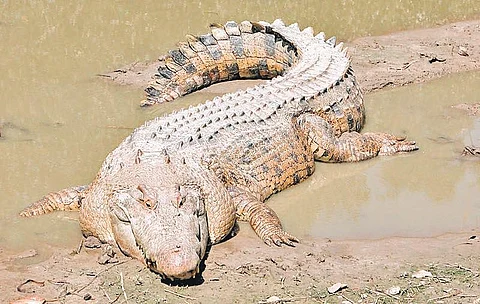

BHUBANESWAR: The mugger crocodile population in the West Deo river system of the Similipal Tiger Reserve (STR) has been recorded at the highest altitude for the species in India so far. As per the research paper 'Population status of Mugger crocodile in STR' published in the Herpetological Bulletin of the British Herpetological Society, the mugger crocodile, also known as marsh crocodile, has been spotted at a pond in the West Deo river system at an altitude as high as 822 metres above sea level (masl).
Researchers during their survey found an adult crocodile and three hatchlings basking near the pond. The previous highest altitude at which the marsh crocodile had been found was 800 metres. It, however, was a dead sub-adult mugger which had been spotted at this elevation in the Khairi river system way back in 2004. In the current survey, the researchers found at least 90 per cent of the crocodiles in the river systems of STR above an altitude of over 750 masl.
The lowest altitude at which the reptile spotted was 380 masl. During the survey, researchers recorded a total 82 muggers in the river systems of West Deo, Budhabalanga and Khairi. The number was three less than the previous population of 85 recorded in the river systems in 2005 and 2011.
While assessing the distribution of the population in STR river systems, the researchers also found that of the total 82 muggers, 70 (85%) have concentrated in West Deo river system. The number of muggers in West Deo is high as it is longer than other rivers of the STR and has greater availability of fish, revealed the study. It stated that the STR has a sustainable population of marsh crocodiles since 1981 due to the reintroduction programme as well as relocation of human population away from the river systems.
Relocation of villages with fishing folk over the years has helped significantly in minimising fishing pressure in the river systems of the STR, the researchers said and added that the species has been included in the Schedule I of the Wildlife (Protection) Act, 1972 to ensure better protection.